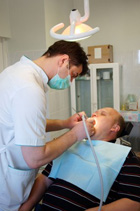 What is an abscess?
What is an abscess?
A tooth abscess, known as periapical abscess, is a collection of pus, which develops inside the tooth structure. Abscesses that develop in the gums are known as periodontal abscesses.
What causes an abscess?
Abscesses develop as a result of bacterial infection. Bacteria infect the tooth and spread, causing the pulp of the tooth to become infected. The pulp contains all the living tissue, including the nerves and blood vessels, but once the pulp is infected, the tooth can effectively die. Bacteria will continue to spread through the tooth until they reach the alveolar bone and this is where the abscess forms.
Bacteria enter the teeth through caries (also known as cavities). Cavities develop as a result of poor oral hygiene and eating a lot of sugary and acidic foods. Once the tooth is infected, the bacteria can spread through the tooth is the cavity is left untreated.
How is an abscess treated?
Dental abscesses do not go away on their own and it is important to get treatment as quickly as possible. A tooth abscess is removed by means of root canal treatment. Your City of Leeds dentist will drill through the infected tooth to reach the abscess and drain the pus, before removing any infected tissue and cleaning and sealing the root canals to prevent further infection. The procedure is carried out under local anaesthetic to prevent pain and discomfort.
Preventing tooth abscesses
The best way to prevent a tooth abscess is to maintain dental health and visit your dentist every six to twelve months. It is also advisable to avoid eating a lot of sugary and acidic foods, which cause decay and to visit your hygienist for regular cleaning treatments.














